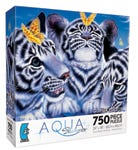Founded as an agency to bring licensed images of well-known American artists' works to the Japanese market, D. Parks and Associates operates successfully in the puzzle, stationery and calendar categories in both the U.S.
April 6, 2018

Founded as an agency to bring licensed images of well-known American artists' works to the Japanese market, D. Parks and Associates operates successfully in the puzzle, stationery and calendar categories in both the U.S. and Japan.
Half of the company's business is generated from U.S. sales while the remainder comes from sales in Japan. Ayako Parks, president of D. Parks and Associates, said she expects the European market to become a bigger part of the business going forward. 
"We have long-term relationships with many of our artists," said Parks. "Thomas Kinkade's art images have been licensed for the Japanese calendar market for many years and we've also licensed Norman Rockwell's images, which are owned by Brown & Bigelow, with our Japanese co-agency for more than 10 years." D. Parks has licensed Rockwell's images for a wide range of product categories, including leather goods, CD covers, calendars, tabletop, textiles, school supplies and stationery products.
The company recently teamed up with its co-agency in Tokyo to license 13 Rockwell images to Canon for their Canon printers campaign. "This is a unique license agreement that allows registered Canon printer buyers to use a password on Canon's website to download selected Norman Rockwell images," she said. Users can then print the images from the download to create their own calendars, greeting cards, T-shirts and gallery prints. 
D. Parks has an exclusive with Kentaro Nishino, a Japanese artist known for his wildlife paintings. After its initial line of puzzles with Nishino's images had a strong launch last year, Ceaco Puzzles has added a second series of three puzzles to its lineup. "More of Kentaro's images are expected to be added later this year," said Parks.
Parks would like to expand Kentaro's artwork and brand name to new licensed product lines, particularly in school supplies, stationery, toys and computer-related products.
You May Also Like






